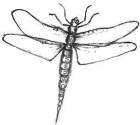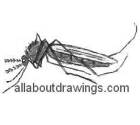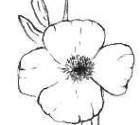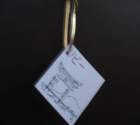Search for images or info
Butterfly Pencil Drawings
Butterfly pencil drawings are a way of recording your own observation of this magnificent little creature.
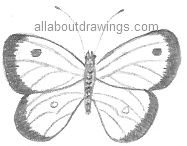
Observation is an important ingredient if we hope to be successful artists. Another aspect is to learn how to draw our own perceptions rather than mimic what others see.
But first, let's start with small steps and learn the basics about butterflies.
This is a simple illustration of a Common Sulphur Butterfly.
I think it's pretty even though it is labeled as common.
I did these butterfly pencil drawings in my second year of teaching myself to draw so I can confirm it is an easy topic.
You can use drawings to communicate your ideas and your interpretation of nature.
We (as artists) make it easy for people to understand the beauty of the butterfly, not by words, but by our illustration.
In my opinion, even a simple outline is an attractive drawing.
When you are teaching yourself to draw, it is important to choose topics that appeal to you as well as make sure it is simple enough for the skill level you possess at the time.
Selecting and depicting a difficult topic is a good challenge providing you have the right mindset. As beginner artists, we must protect our fragile egos by setting tasks that we know we can achieve without too much frustration.
Drawing butterflies is easy and enjoyable so let's get to it...
Features Of The Butterfly
Here's what to look for when you do your next butterfly sketch. I enlarged this outline so you can clearly see every feature that I describe below.
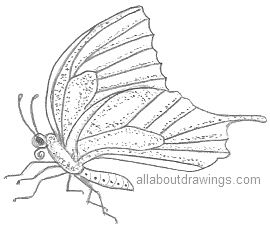
A butterfly ranges in size from one eighth of an inch to about twelve inches. Its tongue is like a long tube which is rolled up when not in use. The tongue (called a probosci) is used to suck up flower nectar and water for nourishment. You can see it in the outline above, just under his eye.
All butterflies have 4 wings - two at the front and 2 smaller wings at the back.
There are 3 main parts to the body:
- The head that has 2 antennae.
- The thorax - 6 legs grow from the thorax, it may look like there are only 4 but the 2 legs at the front are tiny.
- The abdomen which is hidden by the hind wings
Categories
Sketches
Instruction
Freebies
Other Areas

** Disclaimer: I receive a small commission if you buy via my links -- at no extra cost to you. **
The How To Sketch Guide
Here's a book that finally dispels the mystery of sketching!
... it only takes a little instruction
or guidance... Read more >>
A Pencil Has Other Uses
Those little bits of information above will help you draw with more thought to detail and to achieve a good likeness.
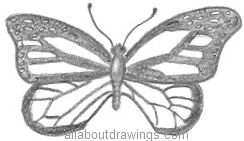
My next choice was to illustrate the Monarch Butterfly.
This black and white version doesn't have the same impact without the distinct orange coloring but I like it just the same.
To assist me whilst doing these butterfly pencil drawings, I used my pencil to gauge the width of each wing.
Holding the pencil horizontally, I place the tip of the lead at the body and I put my finger on the pencil at the widest point of the wing to obtain that measurement. Then, keeping my finger on that place on the pencil, I move it across to see if the other wing is approximately the same size. This helps me roughly draw to proportion.
You may notice the wings are not exactly alike and maybe that just proves I didn't trace them. I know I will improve with more practice. Time and patience is on my side, how about you?
To find any errors, you can check your outline in the mirror to see if it is lop-sided. It's better to find little mistakes now when you have only done the outline and not the full sketch.
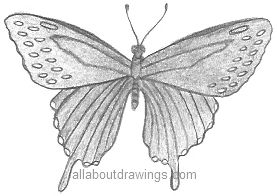
This is my rendition of a Black Swallowtail Butterfly.
The easiest perspective is the side-on view but I can't resist illustrating both wings because of its visual beauty.
Doing butterfly pencil drawings is an interesting exercise because you need to concentrate on getting the two sides to be in proportion with each other.
Now is a great time for you to experiment with creating butterfly pencil drawings -- also try this observation exercise for a bit of extra fun.
All it takes is practice and the faith that you can draw and you will succeed. I promise that drawing does get easier with time.
Click a link below to view more butterfly illustrations:
Other articles for you to enjoy...
* Allaboutdrawings.com is a participant in the Amazon Services LLC Associates Program, an affiliate advertising program designed to provide a means for sites to earn advertising fees by advertising and linking to Amazon.com.
Copyright © 2005 - 2025 www.allaboutdrawings.com. All rights reserved.







